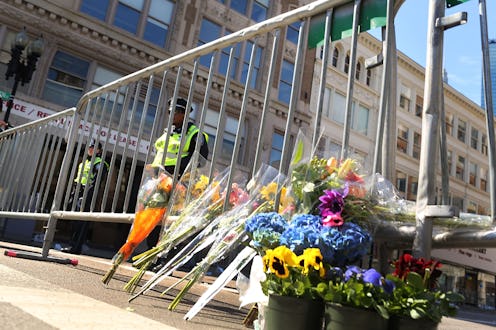News
Boston Bomber Suspect Will Face Death Penalty
On Thursday, Attorney General Eric Holder announced that the Justice Department is seeking the death penalty for Dzhokar Tsarnaev, the Boston Marathon bombing suspect set to face trial in a few months. However, Holder's announcement isn't as cut-and-dry as it sounds: The sentence of capital punishment isn't easily handed down, and Tsarnaev won't necessarily face death if he's found guilty. Particularly in the state of Massachusetts, where Tsarnaev will be tried, pushing for the death penalty will be an uphill battle.
On Thursday, Holder announced:
After consideration of the relevant facts, the applicable regulations and the submissions made by the defendant's counsel, I have determined that the United States will seek the death penalty in this matter. The nature of the conduct at issue and the resultant harm compel this decision.
And from the official eight-page document confirming Holder's decision:
Dzhokhar Tsarnaev received asylum from the United States; obtained citizenship and enjoyed the freedoms of a United States citizen; and then betrayed his allegiance to the United States by killing and maiming people in the United States.
Advocates say that this is exactly why America has capital punishment: to execute people like Tsarnaev, who is charged with killing three people and wounding 250 last April in the worst bombing on American soil since 9/11. However, Massachusetts is not one of the 32 American states that allows the death penalty; the state abolished it back in 1984.
But due to the severity of his alleged crime, Tsarnaev is being tried in federal court, which does allow for execution. He's facing 30 federal counts for allegedly placing two bombs near the Boston Marathon finish line on April 15 last year. Seventeen of those counts carry possible sentences of the death penalty.
However, seeking the death penalty in federal court is an uphill battle. The Justice Department has tried to impose the death penalty on several defendants in federal court in the last five years, but according to CBS News, not one of those cases has ended with anyone being placed on death row.
Tsarnaev's alleged co-conspirator, brother Tamerlan, was killed during a police shoot-out three days after the bombing. In short, Tsarnaev will take full legal responsibility for the bombing if found guilty — and for some of America, justice in this sense means being federally executed.
Legally, in order for Tsarnaev to be sentenced to death, every member of the jury must agree that it's the right choice. But all members of the jury will live in Massachusetts, and it's not a state that has historically advocated for the death penalty. Several attempts have been made in the last few decades to reinstate the death penalty in Massachusetts, and each one has failed.
And in cases in which federal juries have had to choose between life in prison and the death penalty, they've historically leaned towards life in prison. Not to mention, If Tsarnaev's defense team was to argue that Dzhokar's now-deceased older brother, Tamerlan, was behind the brunt of the planning and placing of the bombs — as they likely will — then the jury may not find that Dzhokar showed enough premeditation and planning to qualify for capital punishment.
Still, in spite of all these legal challenges, one point should be kept in mind: Tsarnaev is not just any defendant. He's at the center of what is going to be a huge and immensely public trial, coverage of which could rival or even eclipse George Zimmerman's (God help us). Many Americans will be pushing for him to be executed. The Boston marathon bombing was one of the worst acts of terrorism in America since 9/11, and the pressure will be on the Justice Department to hand down the most severe punishment that's legally possible.
